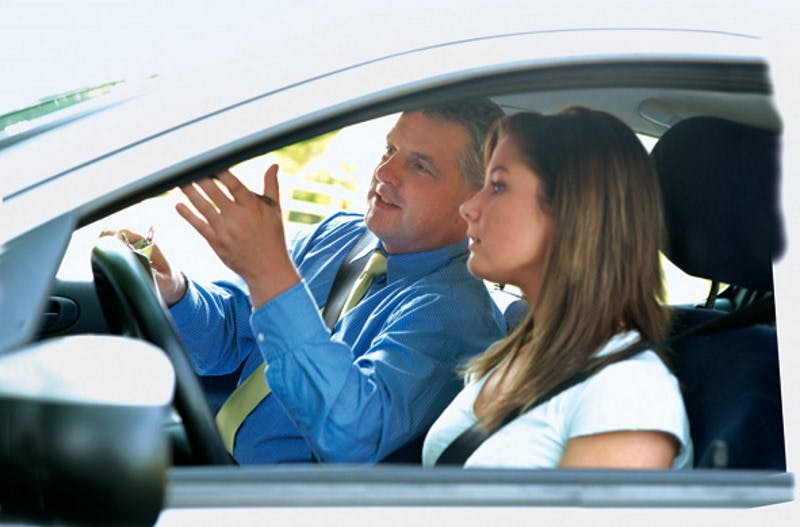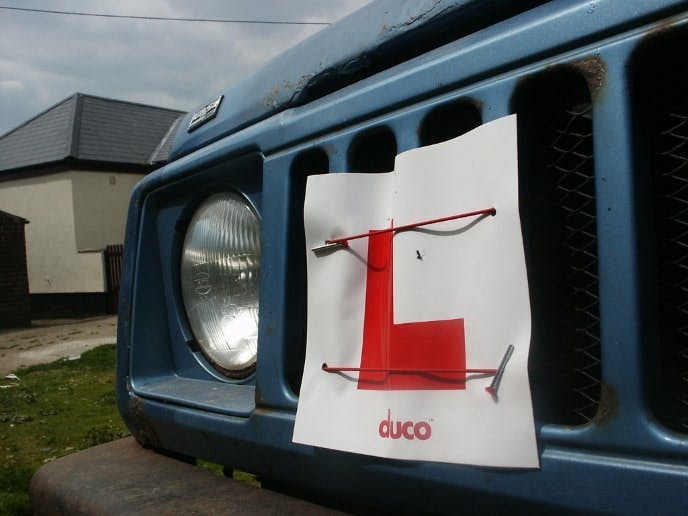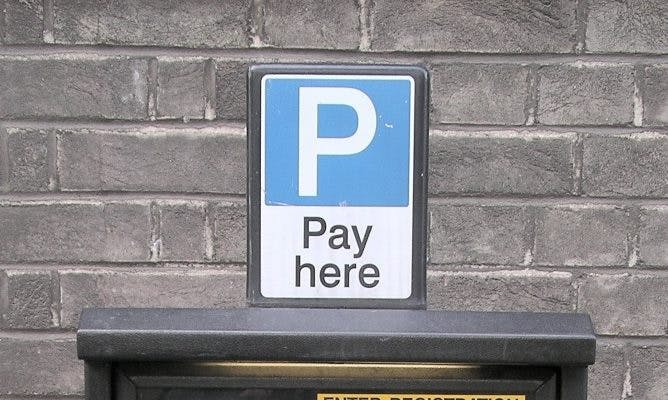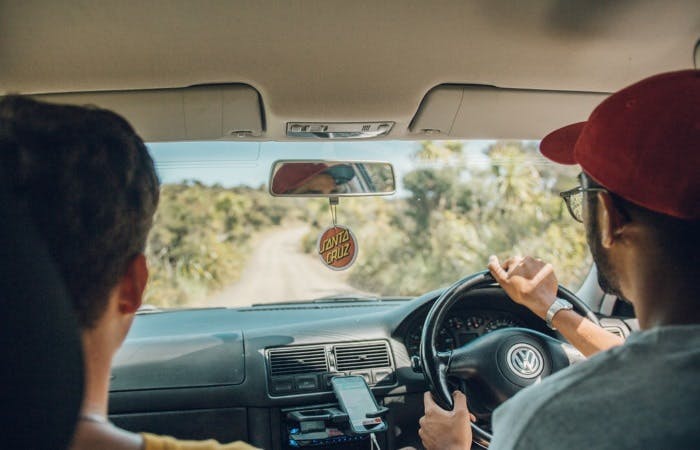Practicing Driving Outside Lessons: What You Need to Know
February 13, 2024
•9 min read
Leon McKenzie
Content Writer

It should go without saying that the best person to teach you how to drive is a qualified driving instructor. While your mum, dad or best friend might be a perfectly good driver, they're likely to have their share of bad habits—and you'll want to avoid picking them up yourself! Still, spending extra time behind the wheel alongside friends and family between lessons with an instructor is a smart move. But beware, practicing driving outside lessons can come with a few complications.
To help clarify things, we've created this helpful guide covering the ins and outs of private driving practice. We'll discuss the advantages and disadvantages of learning with friends and relatives, the laws surrounding practicing driving outside lessons, and answer a few common questions.
Let's begin!
Who can I practice driving with?
If you're champing at the bit to get out on the road, it's likely you'll be looking at practicing driving outside lessons. Before you start begging everyone you know, though, you need to be sure that you can legally practice with them. If you thought you could practice with any driver, you'd be wrong!
You see, the government laid down a few rules as to which drivers can supervise a learner. The regulations aren't overly tight, but do ensure you can only practice with experienced drivers. This is sensible, in our opinion—and you'll learn far more from a confident, skilful driver than a newly qualified one! Specifically, anyone you practice with must:
- Be over the age of 21
- Hold a licence to drive the type of vehicle you're practicing in (such as a manual or automatic car licence)
- Have held this licence (which must be from the UK or an EU or EEA country) for at least three years
At this junction, it's worth noting that the above rules apply to those you're practicing with outside lessons. The process of becoming an actual driving instructor is considerably stricter! Also, it's important to remember that, while someone is letting you practice with them, any rules that apply to you as the driver of the vehicle also apply to them.
So, as it's illegal to use your mobile phone behind the wheel or drive under the influence, your supervising driver must steer clear of these behaviours too.
Will I need insurance to practice outside lessons?

In short, yes. You always need insurance to drive legally on UK roads. When learning with an instructor, the lesson price will cover the cost of this insurance. If you're practicing privately, however, you'll need to organise this yourself.
Remember, the insurance that the car owner already has won't cut it! To be able to practice in someone's car, you need to have insurance to drive it. You've got a range of options available to you here, with the best choice depending on factors such as the pace of your lessons, your test date and whether the car you're practicing in is your own or someone else's. Your choices include:
- Joining the car owner's existing policy as a named driver
- Getting short-term insurance for either your car or someone else's
- Annual insurance — a great option if you're learning to drive in your own car
As you may be able to guess, there's an awful lot of detail to go into on this topic. Luckily for you, we've already covered it in our handy guide to learner driver insurance! So, if you'd like to learn more, go have a read and pop back here when you're done. (No rush; we'll wait.)
Driving without insurance can lead you to incur penalties including an unlimited fine, a driving ban and up to 6 points on your licence.
Are there any other rules or restrictions I need to be aware of?

We've covered a couple of the most important regulations regarding practicing driving outside lessons—but we're not quite done yet. There are a few more rules you'll need to abide by to stay on the right side of the law.
- As is the case in your driving lessons, you must display L plates whenever you're behind the wheel. If you're practicing in someone else's car (and that person is a fully-qualified driver), they should remove these plates when they drive.
- While it's now legal for learners to drive on the motorway, they may only do so if accompanied by an approved driving instructor. So, if the person supervising you isn't an ADI, steer clear of the M roads. (This is yet another reason why you should make the most of motorway lessons with your instructor!)
- As mentioned, any rules that you must follow also apply to anyone accompanying you. This also includes eyesight rules. If the person with whom you're practicing needs to wear glasses or contact lenses when they drive, they should wear them while supervising you, too.
- It's also the job of the supervising driver to ensure that the car is in a safe and legal condition. As part of this, it must hold a valid MOT certificate to attest to its roadworthiness.
Should I pay the person I'm practicing with?

The only people who may charge for driving lessons are DVSA-approved driving instructors and potential driving instructors holding a trainee licence. You can tell if the person supervising you falls into one of these categories by the badge on their car. This will be green if they're an ADI, or pink if they're a PDI (trainee).
If your supervising driver is neither an ADI nor a PDI, it’s illegal for them to charge you for lessons. Of course, if they're letting you use their car to practice, you might need to chip in for the price of fuel, or for your (share of) insurance. You should never, however, pay for the lesson itself.
Can I use private practice as a substitute for lessons with an instructor?

If you're lucky enough to have found someone who's willing to let you drive their car (or are particularly good at twisting your parents' or friends' arms), you might be tempted to avoid paying out for lessons altogether. Given the cost of learning to drive, it's certainly understandable that many want to make savings where possible. However, private practice should supplement your lessons, not replace them. There are plenty of good reasons for this.
Firstly, as we alluded to at the beginning of this article, many drivers pick up a bad habit or two over the years. Some may even think that these imperfections are the right way to drive, and give you advice that you really shouldn't follow. A survey from insurance firm Admiral confirms these concerns, with respondents reporting they'd been told that they didn't have to stop at a stop sign, or even to drive with their knees!
While these anecdotes are clearly at the extreme end of the spectrum, it's certainly true that those who've been driving for a while are unlikely to be 100% up to date with the process of learning today. Take manoeuvres, for example: it was only in December 2017 that pulling up on the right became part of the test.
Meanwhile, at the same time, being able to follow sat nav directions became a mandatory part of the test. A friend or relative may not be totally clued-up on these newer additions to the test. On the other hand, licensed driving instructors must undergo continuous professional development. This means they'll receive constant training, and must always be at the top of their game. In turn, they'll pass on the latest and greatest advice to you, helping you to hit the ground running when you're behind the wheel. Private practice alone can't compare!
If you're interested in booking a PassMeFast course, be aware that private practice should not substitute any course hours. To find your ideal option and get a personalised quote, try out our course recommender.
What are the pros and cons of practising driving outside lessons?
So, we've established that learning alongside an instructor is vital to becoming a safe driver for life. However, this doesn't mean that practicing driving outside lessons is all bad. Here are some of the key pros and cons of private practice.
Pros
- Getting extra practice will boost your skills, confidence and muscle memory
- You'll get more time behind the wheel without paying for extra lessons
- You can practise on any road (except motorways!) and at any time of day
- You'll be able to practise close to home, in a scenario closer to real-life driving
Cons
- You'll need to pay extra for learner driver insurance
- Your supervising driver's advice might conflict with what you've learned from your instructor
- Getting used to a different car may get a little confusing
- Your supervising driver is unlikely to have dual controls, so can't step in
All in all, practicing driving outside lessons generally has a beneficial impact on a learner driver. It's a great way to put the skills you've learned from your instructor into action, and to get into the habit of driving regularly. And, if your supervising driver is a bit rusty themselves, you might even teach them a thing or two!
Practicing driving outside lessons: Your questions answered
1. Where can I practice driving outside lessons?
As we've covered, motorway driving without an instructor is a no-no. Aside from that, the world is your oyster. In fact, you're free to head anywhere from a busy dual carriageway to a winding country road. A note of caution though: if you haven't yet tried out a certain road type with your instructor, you probably shouldn't go there when practicing driving outside lessons. You wouldn't want to head down the A1 when you'd previously only driven down side streets! Find a route that's appropriate for your driving level and stick to it.
2. I've never practiced a certain skill with my instructor. Should I try it out privately?
Probably not. There are plenty of reasons for this. Firstly, when you're trying out a skill for the first time, you need to learn how to do it right. As mentioned earlier, instructors are great at this, while parents are... less so (no offence, parents!). Secondly, if a skill is new, there's a risk that you might perform it incorrectly.
Take parallel parking, for example. Reverse a little bit too far, and smash—you've just hit a parked car. Instructors almost always have dual controls, enabling them to take action to stop you making any major mistakes. It's unlikely a private car will have the same, making it much harder for your supervising driver to jump in and help.
3. Are there any restrictions on which times of day I can practice?
Nope! The curfews imposed on learners in certain countries don't apply here in the UK. So long as you meet all the usual requirements to drive a vehicle, you can take to the road at any time. This means you can even practice driving at night. In fact, as it's almost certain you'll need to do so at some point, it's actually a good idea to give it a go while you're under the watchful eye of a more experienced driver.
4. Where should the supervising driver sit in the car?
Aside from the driving seat itself (which may get a bit uncomfortable), any seat is acceptable. However, it's strongly recommended that supervising drivers sit in the front passenger seat. Here, they'll more easily be able to guide you, as well as having access to the controls of the car should an emergency occur.
5. How many passengers can I carry while practising driving outside lessons?
There's no specific limit here—you can carry as many passengers as the vehicle legally holds. However, ferrying around a small army of people when you haven't yet passed may be quite nerve-wracking. Unless you're feeling particularly confident behind the wheel, it's probably best to stick to just one passenger. And although it's legal to have your kids in the car too, there are some additional things you should think about before carrying child passengers when you're learning to drive.
6. Can a supervising driver have any points on their licence?
A general rule of thumb you can follow is that if someone is allowed to drive the vehicle in question, they're allowed to supervise a learner (provided they meet the requirements listed earlier!). So, it is acceptable to practice with someone who has points on their licence. The exception, of course, is any driver who's received so many points that their licence has been revoked. The limit is twelve points within three years—or six points within your first two years. (Of course, someone who's only had their licence for two years isn't eligible to supervise a learner anyway—even with zero points!)
7. If I'm involved in an accident while practicing driving outside lessons, who's responsible?
Should a nightmare scenario arise that sees you involved in a crash while practicing, you (as the person behind the wheel) are typically responsible. After all, a supervising driver can largely give only verbal advice, and can't often act themselves. It's up to the learner to display care and defensive driving techniques so as to avoid accidents.
Additionally, as the Highway Code applies to drivers with a provisional in the same way as those with a full licence, a learner driver behind the wheel will be liable for any driving offences they commit. If a speeding offence is committed, the owner of the car will usually receive the letter. They can then notify the authorities that the learner was behind the wheel and committed the offence. An exception to this rule is that a supervising driver under the influence of either drugs or alcohol may be deemed not to be in control of the vehicle. In such instances, both they and the learner may receive a penalty.
Subscribe for driving advice, offers & more
We'd love to let you know about our courses, news and offers via email. You may unsubscribe at any time.
Star Genie Limited trading as PassMeFast. Company number 10093359
Copyright © 2024 owned by Star Genie Limited
PassMeFast, Blue Tower, MediaCityUK, Salford, M50 2ST
